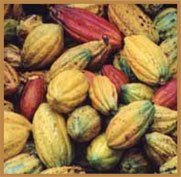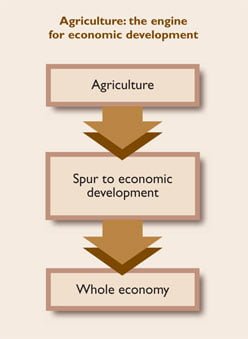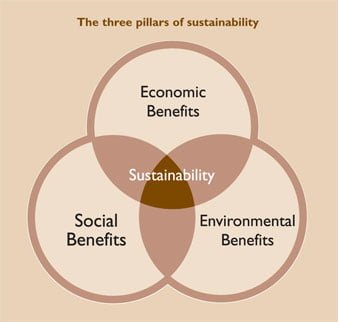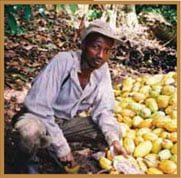
Stretching from Cape Town in South Africa, across the Sahara Desert, to the Mediterranean Sea in the north, Africa is the world’s second largest continent. It is rich in natural resources such as oil and gold, and enjoys many different climates that support the growth of crops as diverse as cereals in the savannah lands to cocoa in the tropical rainforest zones.
Despite all this natural wealth, the people of Africa have actually become poorer over the past 25 years, with many nations falling into the United Nations category of least-developed countries (LDCs). This means that:
- family incomes are very low
- health standards are poor with HIV Aids rates high
- opportunities for education are poor.
Altogether, these conditions mean that citizens are very vulnerable, particularly those involved with agriculture. Over the years, many African countries have found it tough to develop their economies, and investment in the agricultural sector has been low. This means that farming has often become unsustainable.
To improve their position and ensure sustainable development in agriculture, farmers need to produce higher yields from their crops without damaging their environment. This can only be achieved by dealing with pests and diseases, and by using better planting material.
Sustainable agriculture will mean that the farmers can grow crops for their families, and for sale at local village markets (food crops) as well as crops to be traded with other countries (export crops) for years to come without damaging the environment.
The plight of Africa was in the headlines in 2005 when the G8 countries met at Gleneagles in Scotland to discuss world policy issues. At the same time, headlines were being made through a series of concerts called Live8. These took place in ten cities around the world. Both the world’s leaders and musicians helped people around the globe to understand some of the issues affecting Africa.
Economic development

In LDCs where industry is relatively underdeveloped, agriculture is very important to the economy as a whole. It is described as an engine of economic development. When crops fail, the entire country is affected, but when the agricultural sector does well it:
- provides food for local communities and crops for export
- improves incomes for farmers and their workers
- stimulates local economic activity by increasing demand for goods and services
- enables people, both at a local and national level, to buy more goods and services
- creates jobs
- increases living standards.
A strong agricultural sector will therefore help poor countries to take a step away from poverty, and towards prosperity.
According to the UK’s Department for International Development (DFID), ‘There is a mass of evidence that increasing agricultural productivity has benefited millions through higher incomes, more plentiful and cheaper food, and by generating patterns of development that are employment-intensive and benefit both rural and urban areas. More importantly, it has provided the spur to economic development outside agriculture where growth and job creation are faster and wages higher.‘
Investment in agriculture leads to economic development for the whole country. This multiplier effect generates income with each round of spending. As farmers sell their crops, they receive income.
This income may be spent locally, helping to fund resources such as education, water, health services and infrastructure. More people will be employed as a result and so the multiplier effect continues adding to the economic development of the region, and ultimately that of the country. All of this development will have started in the agricultural sector.
Sustainability and sustainable agriculture
‘Sustainable development meets the needs of the present without compromising the ability of future generations to meet their own needs’ (The Brundtland Report).

A sustainable agricultural sector is one that can be maintained without exhausting natural resources. There are three important elements of sustainable development: economic, environmental and social.
These are often called the ‘Three Pillars of Sustainability’. Together, these pillars link through a process of mutual interdependence to achieve sustainability.
Sustainable cocoa supply chain
Cocoa, an essential ingredient of chocolate, is a major export crop for several West African countries. The world’s two largest producers of cocoa are the Cote d’Ivoire and Ghana. It is estimated that more than one million smallholder farmers in these countries are growing cocoa, to support their rural livelihoods and contribute to their respective national economies.
Small farmers in West Africa face many problems, such as pests and disease. They lack the cash to invest in growing crops. Although foreign aid in the form of donations from one country to another may be useful these tend to be helpful for only a short period.

Farmers need long-term assistance in order to create sustainable agriculture. For example:
- better planting materials
- assistance with crop management techniques
- help to deal with pests
- formation of farmers’ groups.
Many large food manufacturing companies within the UK are members of the BCCCA: the Biscuit, Cake, Chocolate and Confectionery Association. The chocolate and cocoa industry in the UK, and across the world, has active programmes in place to help the farmers and their families who rely on cocoa for their livelihood.
Economic benefits
Cocoa smallholders are helped to expand their businesses, and make their farms sustainable. Farmers will enjoy a better standard of life, including a better income. Yield has increased on labour-intensive small farms and many have received help to set up co-operatives.
‘Farmer Field Schools’, which are ‘schools without walls’ and operated in partnership between the cocoa industry and civil society groups, are an example of a successful programme to help farmers improve their livelihoods. This project puts money into the family home by educating farmers on better farming techniques and promoting crop diversification.
Working through the Sustainable Tree Crops Programme (www.treecrops.org), the schools offer an 18-session course. This helps farmers to improve productivity with new agricultural knowledge and techniques. Participation is high, with entire villages turning out in some areas for the interactive sessions. The Sustainable Tree Crops Programme also supports the development of co-operatives in the Cote d’Ivoire and Ghana. Co-operatives help farm families to grow and market their crops more effectively, leading to 15-40% increases in farming incomes.
Environmental benefits
Trees are important as they conserve soils, conserve moisture, protect the landscape, enhance biodiversity and provide many other environmental services. Lands planted with a variety of tree species are called agroforests. Investment in research helps to create tree biodiversity and better plant species. This helps to support the continued output of cocoa and therefore farmer incomes. For example, investment in research has helped farmers to obtain better planting materials.
Chocolate manufacturers support research programmes which focus on two key aspects of sustainable cocoa production:
- The effective control of a variety of pests and diseases that affect cocoa crops.
- Support for plant breeding initiatives to ensure that growers have access to cocoa trees which allow them to grow new varieties that perform well in local environments.
Social benefits
Agricultural communities are supported through the provision of better facilities within village life, such as access to education, HIV education and improved health facilities. This encourages people to continue living in rural areas and discourages urban drift. Valued lifestyles are therefore continued and improved.
A programme with Winrock International works to improve access to education at the farm village level (www.winrock.org). This looks at a range of possible initiatives, from teacher training and curriculum improvements to building and expanding school facilities. These programmes share a common approach: to make improvements that are widespread and permanent.
Conclusion

Cocoa is an important export crop for a number of West African countries and will remain so. It has an important role to play in employment, farmers’ incomes and export revenue generation.
To take full advantage of these opportunities, however, farmers need help to develop more efficient and sustainable ways of growing cocoa (and other crops too). The cocoa and chocolate industry is actively engaged in making such changes possible through working with all interested parties, including farmers themselves. Such developments will best ensure that there are adequate supplies of cocoa to make the chocolate that we enjoy.
By doing this, the cocoa and chocolate industry has actively helped to provide a better and longer-term future for all those involved in it. This supports the economic, ecological and social interests of cocoa farming communities. In a modern and everchanging world, it has helped them to build a supply chain that is improving the lives of millions of people.
